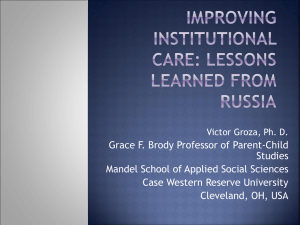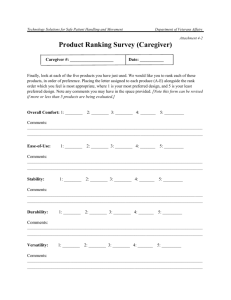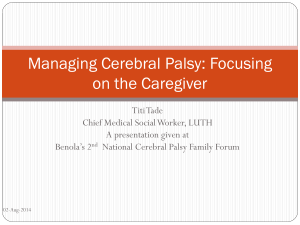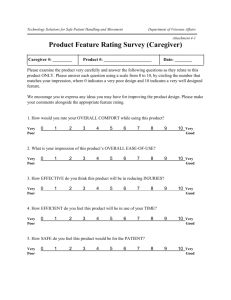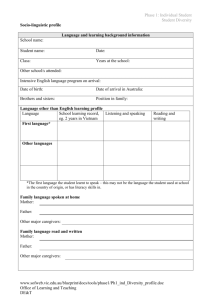Retrospective evaluation of a telephone skills-building program for caregivers of
advertisement
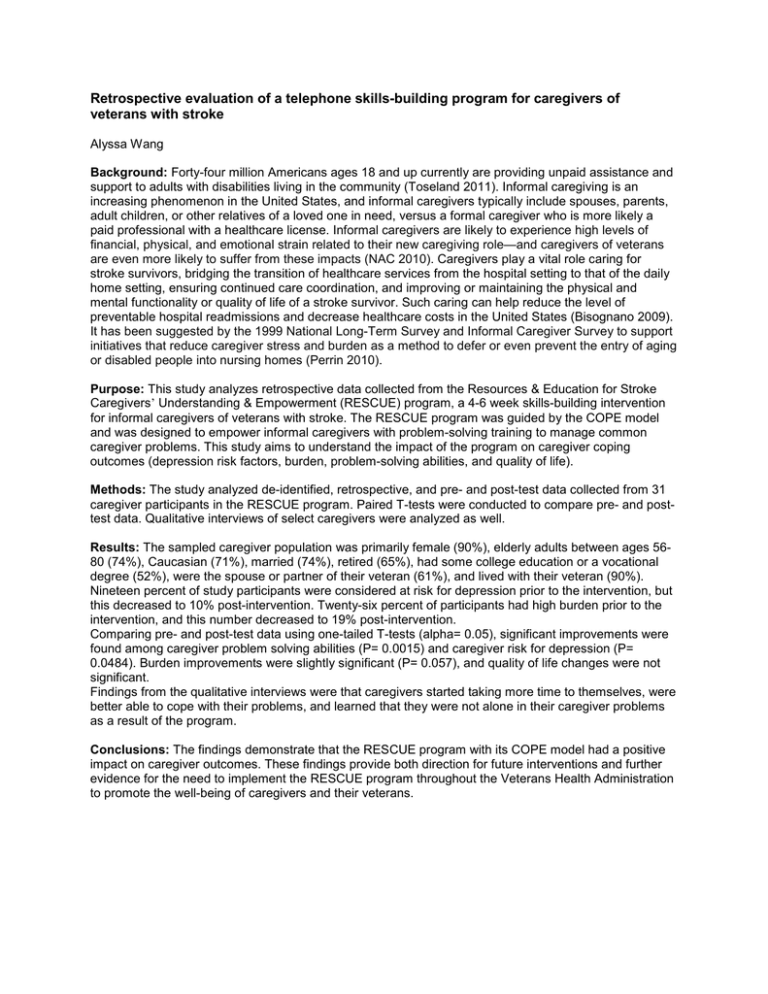
Retrospective evaluation of a telephone skills-building program for caregivers of veterans with stroke Alyssa Wang Background: Forty-four million Americans ages 18 and up currently are providing unpaid assistance and support to adults with disabilities living in the community (Toseland 2011). Informal caregiving is an increasing phenomenon in the United States, and informal caregivers typically include spouses, parents, adult children, or other relatives of a loved one in need, versus a formal caregiver who is more likely a paid professional with a healthcare license. Informal caregivers are likely to experience high levels of financial, physical, and emotional strain related to their new caregiving role—and caregivers of veterans are even more likely to suffer from these impacts (NAC 2010). Caregivers play a vital role caring for stroke survivors, bridging the transition of healthcare services from the hospital setting to that of the daily home setting, ensuring continued care coordination, and improving or maintaining the physical and mental functionality or quality of life of a stroke survivor. Such caring can help reduce the level of preventable hospital readmissions and decrease healthcare costs in the United States (Bisognano 2009). It has been suggested by the 1999 National Long-Term Survey and Informal Caregiver Survey to support initiatives that reduce caregiver stress and burden as a method to defer or even prevent the entry of aging or disabled people into nursing homes (Perrin 2010). Purpose: This study analyzes retrospective data collected from the Resources & Education for Stroke Caregivers’ Understanding & Empowerment (RESCUE) program, a 4-6 week skills-building intervention for informal caregivers of veterans with stroke. The RESCUE program was guided by the COPE model and was designed to empower informal caregivers with problem-solving training to manage common caregiver problems. This study aims to understand the impact of the program on caregiver coping outcomes (depression risk factors, burden, problem-solving abilities, and quality of life). Methods: The study analyzed de-identified, retrospective, and pre- and post-test data collected from 31 caregiver participants in the RESCUE program. Paired T-tests were conducted to compare pre- and posttest data. Qualitative interviews of select caregivers were analyzed as well. Results: The sampled caregiver population was primarily female (90%), elderly adults between ages 5680 (74%), Caucasian (71%), married (74%), retired (65%), had some college education or a vocational degree (52%), were the spouse or partner of their veteran (61%), and lived with their veteran (90%). Nineteen percent of study participants were considered at risk for depression prior to the intervention, but this decreased to 10% post-intervention. Twenty-six percent of participants had high burden prior to the intervention, and this number decreased to 19% post-intervention. Comparing pre- and post-test data using one-tailed T-tests (alpha= 0.05), significant improvements were found among caregiver problem solving abilities (P= 0.0015) and caregiver risk for depression (P= 0.0484). Burden improvements were slightly significant (P= 0.057), and quality of life changes were not significant. Findings from the qualitative interviews were that caregivers started taking more time to themselves, were better able to cope with their problems, and learned that they were not alone in their caregiver problems as a result of the program. Conclusions: The findings demonstrate that the RESCUE program with its COPE model had a positive impact on caregiver outcomes. These findings provide both direction for future interventions and further evidence for the need to implement the RESCUE program throughout the Veterans Health Administration to promote the well-being of caregivers and their veterans. MPH Competencies strengthened by the project: The literature review allowed me to understand caregiver health problems and what types of interventions exist or are being studied to mitigate their health issues. Through the stress and coping model (D’Zurilla 1986), I was able to better understand the issue from an ecological framework perspective. Concentration competencies strengthened by the project: I was able to contribute to an evaluation on the effectiveness of an intervention to offer caregivers the support that they need. This required my data organization and analysis skills. Public Health Relevance: This special project allowed me to learn more about the unique health issues experienced by veterans. Additionally, I became more aware of health issues faced by a population I had never thought to consider before: caregivers. I was able to contribute to a project that could be implemented on a larger scale throughout the Veterans Health Administration. REFERENCES: Bisognano M, Boutwell A. (2009). “Improving Transitions to Reduce Readmissions.” Frontiers of Health Services Management, 25(3):3-10. Link URL: http://search.proquest.com/docview/203882770?acountid=10920 D’Zurilla TJ. (1986). “Problem solving therapy: A social competence approach to clinical problem solving. New York: Springer Publishers.” National Alliance for Caregiving (NAC). (2010). "Caregivers of Veterans – Serving on the Homefront: Report of Study Findings." United Health Foundation. Perrin PB, et al. (2010) “A culturally sensitive Transition Assistance Program for stroke caregivers: Examining caregiver mental health and stroke rehabilitation.” Journal of Rehabilitation Research & Development. 47(7):605-616. Toseland RW, Haigler DH, Monahan DJ. ( 2011). “Education and Support Programs for Caregivers: Research, Practice, and Policy.” New York: Springer.
